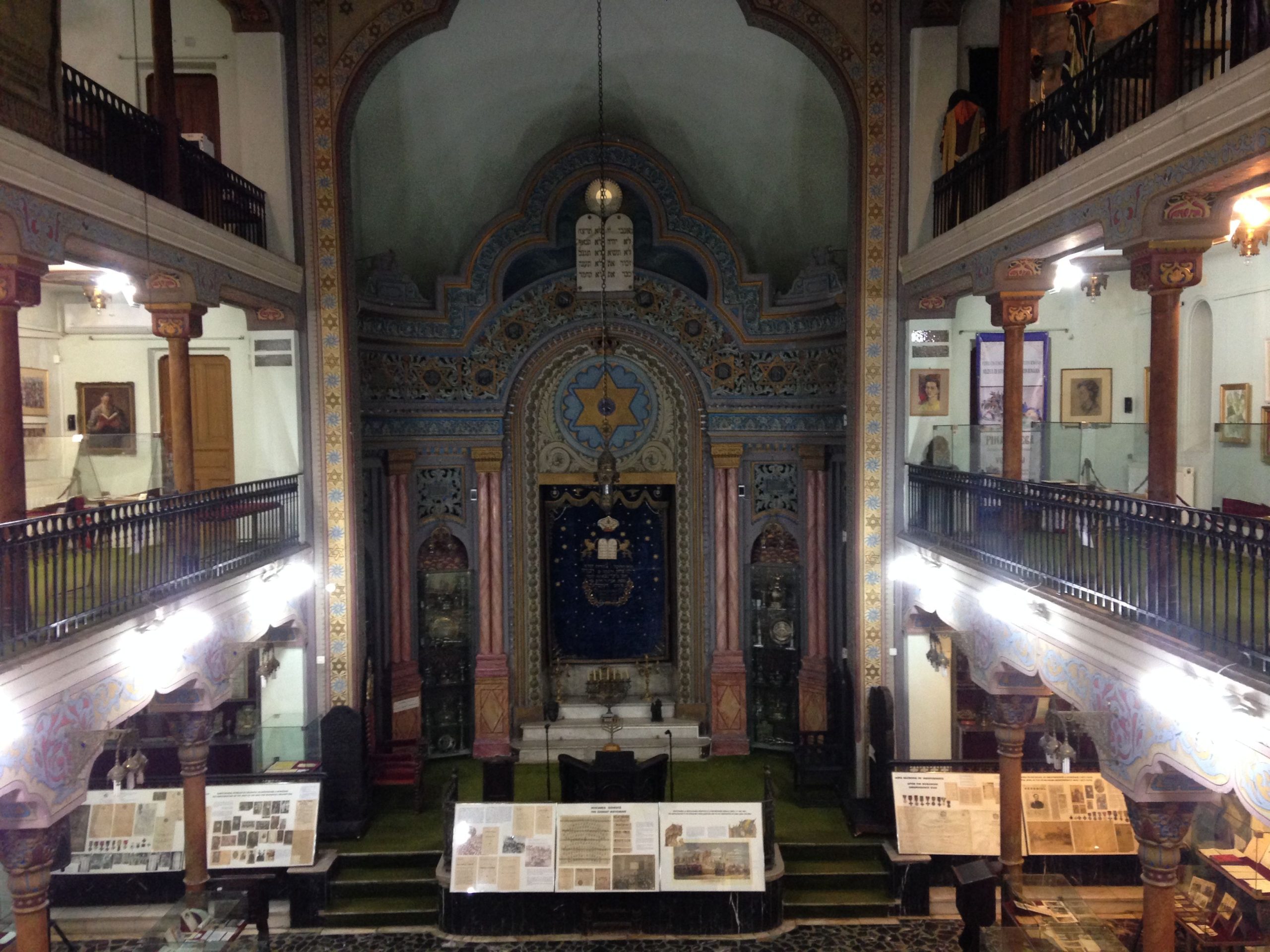
After the fall of Ceauşescu, Jewish life continued for the small aging community. Toward the end of the Communist era, the number of Jews dropped to19,000, and as of 2023 there are about 2,000 Jews living in Romania.
After the fall of communism, the Federation of Jewish Communities in Romania, FCER (Federatia Comunitaţilor Evreieşti din România), has maintained its structure, but the offices of the president and chief rabbi have been separated. The Federation, an affiliate of the World Jewish Congress, is organizing Jewish life and representing Romanian Jewry in governmental matters. After Moses Rosen's death, in 1994, Nicolae Cajal, a member of the Romanian Academy, was elected leader of the community, and served in this role until his death in 2004. Aurel Vainer served in this role for 15 years, from 2005 until 2020, and since 2022 the president of the community is Silviu Vexler.
The majority of Romanian Jews live in Bucharest. Other numerical significant communities include those of Iaşi, Timişoara, Cluj Oradea and Târgu Mureş. At present, the Romanian Jewish community is organized toward meeting the needs of its aging population. Together with The American Jewish Joint Distribution Committee(JDC), which is particularly active in Romania, the Federation insures that all Jews receive basic food and heat in the winter. Synagogues and a religious infrastructure are maintained in many localities, and rabbis who came regularly from Israel are in charge of the religious institutions. Bucharest, Oradea and Timişoara maintain Jewish choirs, and Bucharest and Oradea have also klezmer bands, and the old and famous Bucharest Jewish Theater receives funding from the Bucharest municipality. The Federation of Jewish Communities publishes a monthly newspaper, Realitatea evreiască (The Jewish reality) in Romanian, Hebrew and English, and the Hasefer publishing house issues volumes devoted to Judaism and Jewish history.
As far as Jewish education is concerned, there is a Jewish day school in Bucharest, including The Magna Cum Laude - Reut Educational Complex, established by the Ronald S. Lauder Foundation in 1997, and is considered as one of the best schools in Romania, and in 2006, a high school was opened. However, most of the Jewish children receive basic Jewish education in the community's Talmud Torah courses.
In the 1990s, for the first time in the history of Romania, important universities set up departments for the study of Judaism and Jewish history. In 1991, the Babeș-Bolyai University in Cluj established the Dr. Moshe Carmilly Institute of Judaism and Jewish History, and in 1998 the Goldstein-Goren Center for Jewish Studies was established, as part of the State University of Bucharest. In 2005, the Elie Wiesel National Institute for the Study of the Holocaust in Romania was inaugurated, which carries out research, educational and cultural projects for deepening the knowledge of the Holocaust phenomenon.
Despite that, public discourse was constantly marked by numerous anti-Semitic publications, which focused on denying crimes committed by theIon Antonescu regime against the Jewish population. Partidul România Mare (Great Romania Party, PRM), the first extremist party to emerge after the fall of communism, was also the most aggressive propagator of xenophobia and anti-Semitism. This party, which in 2004 became the third-largest political party, sought to rehabilitate Antonescu’s regime, denied the Holocaust, and claimed a “worldwide Jewish conspiracy.” Other minor extremist political organizations, founded in the early 1990s, claimed affiliation to the tradition of the Iron Guard. Among them, Mişcarea pentru România (Movement for Romania), led by Marian Munteanu, the Party of National Right led by Radu Sorescu, the ultranationalist movement Vatra Românească (Romanian Cradle), led by Ion Coja, and Şerban Suru’s Legionary Movement.
In 2003, an international commission of historian to study the Holocaust in Romania was established. The report issued by the commission chaired by Elie Wiesel was accepted by president Ion Iliescu and by his successor, Trăian Băsescu, and in 2004, Romania joined the International Holocaust Remembrance alliance. The date of October 9 was designated to commemorate the Holocaust in Romania, because on October 9, 1941, the deportation of Jews from Bucovina to Transnistria began.
In the post communist era, several Jewish museums were opened in Romania. In 2015, the Museum of the History of the Romanian Jews, the first Jewish museum in Romania established in 1978 in Bucharest, started a process of renovation, and in 2019, the new display was opened to the public. In 2002 the Elie Wiesel's childhood home in Sighet opened as a museum, "The Memorial House of Elie Wiesel", including a display on his life and activity, and on Jewish life and culture in Sighet and Maramureş. In 2022, the museum was renovated and reopened to the public. The Northern Transylvania Holocaust Museum was established in the synagogue of Simleu Silvanei in 2005, and in 2020 The Museum of Jewish Theater and the Museum of the Iaşi Pogrom opened in the House of Museums in Iaşi.
Hasidic Judaism and Haredi Judaism are also present in Romania nowadays. Chabad has a synagogue, the Yeshua Tova Synagogue, a kosher restaurant, a kindergarten, and a school, all of them in the center of Bucharest. The group has also two community centers, one in Voluntari and one in Cluj.
Michael Shafir, “The Inheritors: The Romanian Radical Right since 1989,” East European Jewish Affairs 24.1 , Summer 1994,71–89
https://www.muzeulliteraturiiiasi.ro/muzeul-teatrului-evreiesc-in-romania
https://www.stiripesurse.ro/primul-muzeu-al-pogromului-si-muzeul-teatrului-evreiesc-inaugurate-la-79-de-ani-de-la-masacrul-evreilor-din-iasi_1480148.html